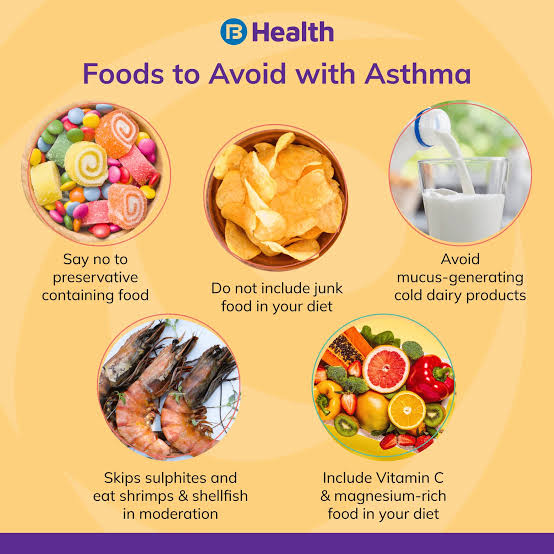
It is known that bronchial asthma does not cure completely, and its symptoms visit the patient when the factors that contribute to its outbreak are present. Effective medications can make the sufferer live a normal, calm life away from annoying symptoms and crippling attacks.
If medications are useful in curbing asthma attacks, the role of food in this area should not be overlooked. It is true that there are food allergens that trigger asthma, but it must not be forgotten that there are foods that have their weight in preventing this disease. According to a study conducted by researchers from the Portuguese University of Porto, the severity of asthma in adults decreases by 80 percent when applying a diet. A diet similar to that used in the countries of the Mediterranean basin, rich in antioxidants and anti-inflammatories, provided that the mentioned diet includes no less than 300 grams of fruits daily.
Therefore, the mainstay of the diet in asthma must be vegetables and fruits, and it is preferable if the choice falls on fresh, naturally produced “Bio” foods in order to reduce, as much as possible, pollutants, chemical compounds, and suspicious additives, which are many of them these days. Various vegetables and fruits are rich in antioxidants, such as beta-carotene, vitamin C, vitamin E, selenium, zinc and magnesium, which are believed to have the ability to protect the respiratory system from inflammatory processes that pave the way to asthma. Also, care must be taken to provide sufficient omega-3 fatty acids, the importance of which research has shown in preventing asthma problems, and to reduce foods rich in saturated fats.
The details of the system that is useful in preventing asthma attacks include the following:
1- Grains, and you should choose whole grains that are full of vitamins and minerals. As for white bread and pastries made from refined flour, one should be careful with them.
2- Dry legumes, 2 to 3 times a week, alternating with rice, semolina, and potatoes.
3- Dry fruits and nuts, 3 to 4 pieces daily.
4- Eggs: You can eat 3 to 5 eggs per week.
5- Fatty fish, at least 2 to 3 times a week, as it is rich in omega-3 fatty acids. It is preferable to choose fresh types.
6- Meat: You should choose the lean type that is low in fat, while avoiding ready-made meals, sausages, and snacks that contain a high percentage of saturated fatty acids.
7- Milk and its derivatives. Milk can be consumed according to desire if tolerated, and it is better to consume yogurt.
8 – Water. You must drink enough of it to avoid dehydration and facilitate the exit of phlegm.
9- Sugary drinks, it is preferable to stay away from them, or limit yourself to a small amount of them.
10- Table salt, which should be used at a minimum and not consumed in excess. In a study published in the American journal “Medicine, Science and Sports” late last month, researchers from Indiana University examined the effect of the amount of table salt consumed on a daily basis and its relationship to the recurrence of asthma attacks. They found that reducing Eating salt in turn reduces the degree of distress in bronchial inflammation in the lung that often accompanies asthma attacks.






